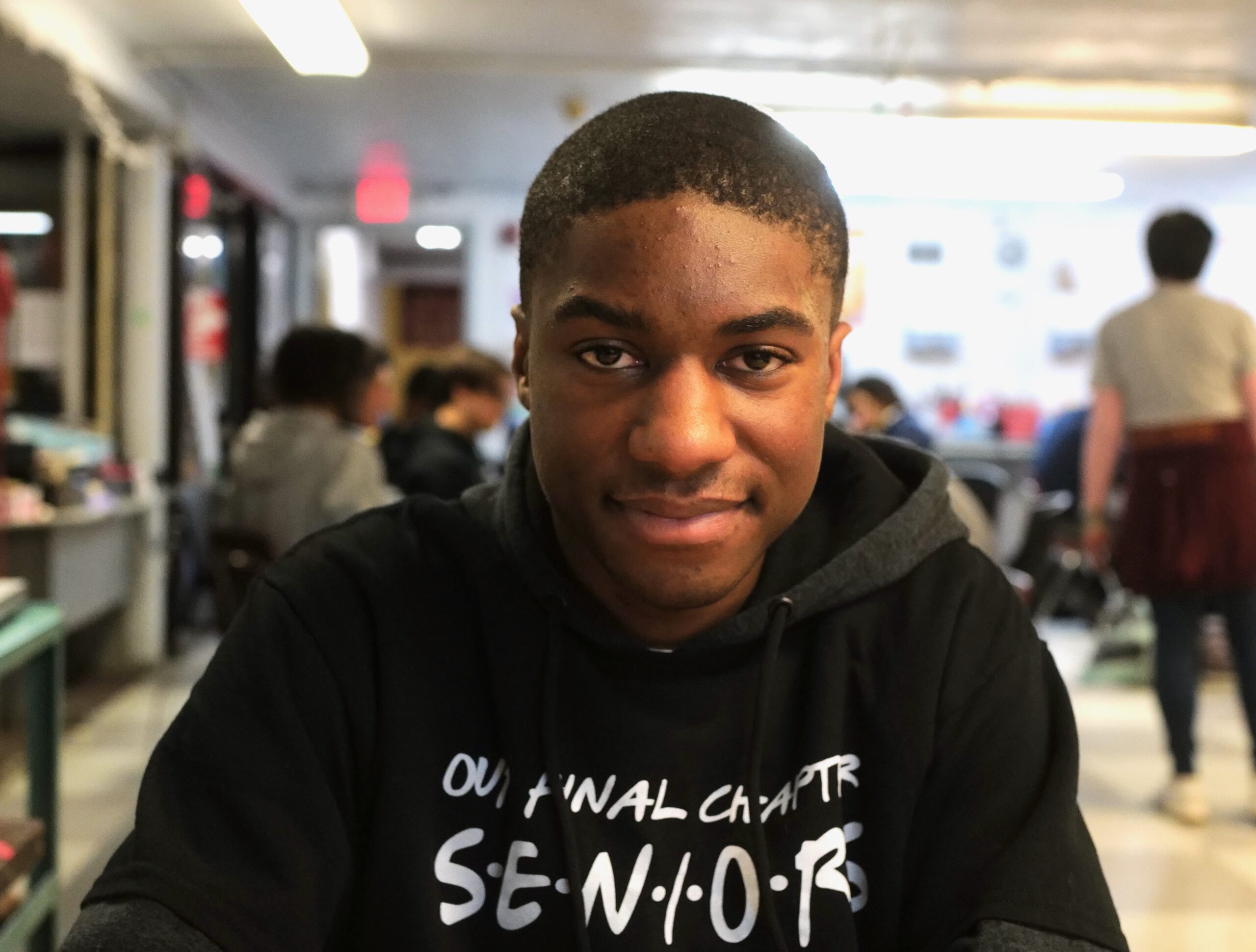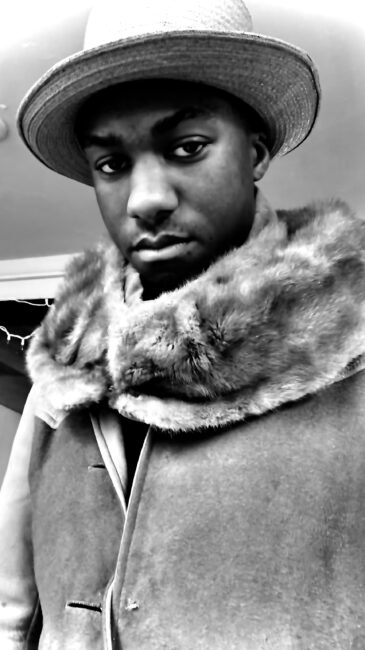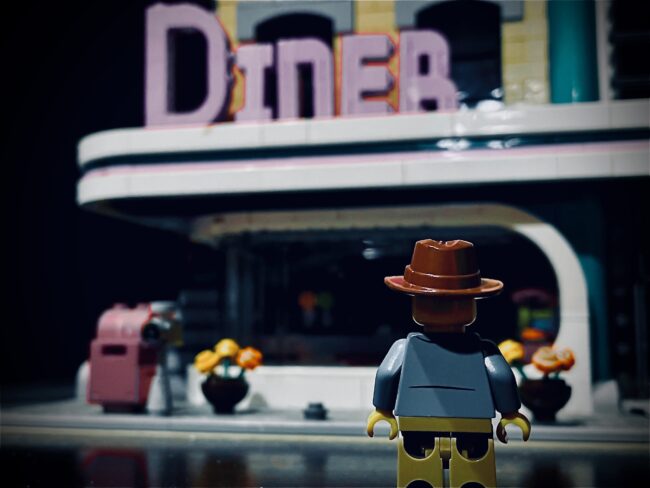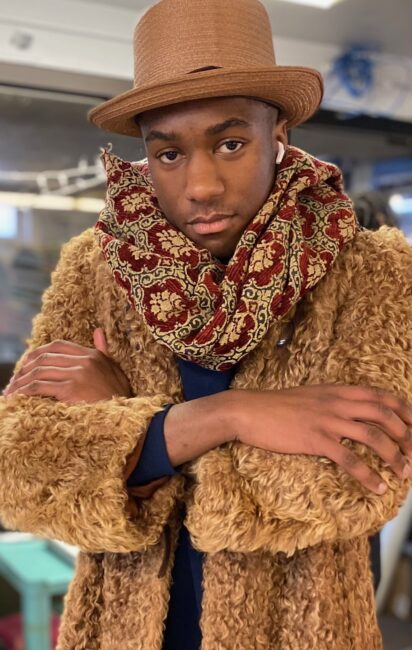Today, I had a great meeting with a Senior At Bishop Gibbons High School Named Jared Merevay. He is taking Sue Silverstein’s wildly popular art class at the high school.
His work is extraordinary, and so is his significance.
His vision – striking for someone so young – is inventive, creative, and visionary, and he also discusses the future of education, technology, design, and photography.
Jared is truly creative, but his spark was not lit in a conventional school environment but in the extreme depths of the video game culture, which he correctly describes as a gripping and creative world of design, dialogue, interactivity, community, new technology, and imagery.
In the Fall, he’s going to Suny Poli, a New York state college focusing on media and new technologies.
He says his imagination has come alive in Sue Silverstein’s sparingly popular art program. “I like the choice of things and our freedom,” he said.
The excitement of the students is palpable. The classes are for young people like Jared, who is shy, soft-spoken, and quiet but deeply thoughtful. Students are flocking to her class.
Jared has a beautiful vision for photography, which gives him a chance to shape and re-imagine what taking a photograph is. And he is considering tying it to design and other technological art forms.
He lit up when talking about his favorite video game, Red Dead Redemption 2, which he spends five or six hours weekly. It is nothing, if not visceral.
As a former media critic, I often wrote about the creativity and addictive graphics and plots of the gaming world; I was surprised to look at Red Dead Redemption 2 and see this macho and often violent Western focus over and over again on ethics and values. It’stuffed with confrontations and conflict, debates, and complex decisions on responsibility and personal morals.
Where else could he go to have discussions like that?
Its graphics, characters, and lightning pace are also all loud and defiant. Users are pulled into an alien world and given some of the controls.
It’s fashionable to bemoan young people’s time on video games, but many are transformative and creative experiences far more gripping than almost any class in school. On Red Dead, Jared has a lot of control and input; he can edit his games, changing characters, dialogues, and plots and becoming his own part creator.
In that sense, the art class is similar.
Sue Silverstein pursues the same idea differently – she gives the students choice and ownership of the art they want to do. They have many options and are encouraged to make their own decisions about what kind of art and what kind of message to pursue.
Jared says this has opened him up and challenged him. “We’ve never had so many choices and supplies,” one of the seniors told me.
Parents and educators can’t keep up with these games, but more and more, this culture is the centerpiece of some of their most gifted students, who live and learn in a world hidden from mainstream academics.
They set their own agendas, master complex graphics, define art differently and through other mediums, and are forced to make numerous and often morally complex choices.
Today was part one of my conversation with Jared. I will meet with him again next week at Bishop Gibbons. Sue gets a lot of points for this one.
Sue broke this wall by allowing Jared to use some of the ideas and skills he picked up while gaming and thinking about photography.
We talked for an hour about how photography is already changing – Jared has researched the birth of photography to see how it has evolved. “It’s changing all the time,” he says. “Like my video game, I see it as something I can change and put my mark on.”
He did this in Sue’s vintage clothing photo contest, re-imagining himself as a tough guy and ten, an organized crime boss. He also used 300 Leggos to capture and spoof the fashion culture.
Jared is so soft-spoken and quiet that I couldn’t hear him speaking in the art room over the din of the art students. We had to move twice. We traded e-mails and agreed to stay in touch. I asked Jared to think about a digital camera he would like to have to take to college, and his eyes widened, and he said he would think about it.
Jared is an only child and an avid reader of historical fiction; he’s hooked on theories about the JFK assassination. And he likes to bowl with friends.
My school interviews always start slowly; I understand I can be intimidating. But the conversation was too off once we began discussing photography and the future.
I recommended that Jared start a blog so that everyone can see the quite remarkable photographs he is taking. He liked the idea much. He is careful not to show enthusiasm or excitement, but his eyes give him away.
Sue Silverstein raves about his talents; she said he is one of the most gifted art students she has encountered.
Here, Jared uses Leggos to make a statement about Indiana Jones and fashion culture.
We looked at my blog together, and he asked me about several photographs he was interested in. We discussed different cameras – Canon, Nikon, Sony, and Leica. I spoke of the enormous difference my two Leica have made in my photography.





I’m a NY high school guidance counselor, and I can tell you that there IS no such school as “ SUNY Tech.” If this student told you he is going there, it isn’t the case.
He’s going to Suny Poli, Dr. Tuvok. I wrote it down wrong; there is no reason to question his integrity Dr. Tuvok, it was loud and noisy in the wrong, and I wrote it down wrong. The school is called Suny Polytechnic – https://sunypoly.edu/ – I would think this is something a New York guidance counselor would know before they start getting suspicious. Social media gets worse by the day. He’s worked very hard to get there and is quite excited about it.
This is an example of bad manners on line. This man could have politely questioned you about the name of the school but instead chose to rant. As a counselor you’ d have thought he would have been familiar with the shortening of the school name.
I agree, the tone is off, Barbara; I doubt he was an NYC counselor…he would have the heart of the school
Only Tuvok I’ve heard of is a character from Star Trek. I’m guessing the commenter is not a NY guidance counselor. I pass by SUNY Poly quite often. It’s just down the road from where I live in Utica. Good school!
A young man with such broad interests might like reading Jamelle Bouie (NYT),
”
By Jamelle Bouie
Opinion Columnist
One of the works I cited in my column this week is the volume “African-American Political Thought: A Collected History,” edited by the political theorists Melvin L. Rogers and Jack Turner.
The book is a series of essays on the luminaries of African-American political thought, across the history of the United States, by some of the most impressive scholars currently working. It is as close to a comprehensive overview of the African-American political tradition as I’ve read, with chapters on figures from Phillis Wheatley and David Walker (two of the most important Black political thinkers of the early American republic) to Angela Davis and Clarence Thomas.
Standout chapters, in my view, are Carol Wayne White’s essay on Anna Julia Cooper, “Radical Relationality and the Ethics of Interdependence”; Michael McCann’s chapter on A. Philip Randolph, “Radicalizing Rights at the Intersection of Class and Race”; and George Shulman’s chapter on Bayard Rustin, “Between Democratic Theory and Black Political Thought.”
One of the things I hope to do this year is engage with African-American political thought even more than I already have in the hundreds of thousands of words I’ve written for my column. The reason relates to my interest in the past, present and future of American democracy.
The African-American political tradition is deeply engaged with the experience of — and the requirements for — life in a democracy. And while it certainly speaks, like the Anglo-American political tradition, to the nature of freedom in this country, it also speaks in profound ways to the experience of unfreedom and inequality that has defined life in America for many millions of its subjects and citizens. “Because of its sharp focus on the life and afterlife of slavery, African-American political thought brings the American experience of tyranny into sharp relief,” Rogers and Turner write in their introductory essay to the volume.
African-American political thought is also concerned with democracy as something more and greater than just the sum of certain rules, institutions and procedures. What runs throughout the African-American political tradition, Rogers and Turner note, “is the sense that while the formal practices of democracy such as voting matter, it is a mistake to treat democracy merely as a form rather than a way of life that extends well beyond the voting booths.” Democracy in this vision is “a cultural enterprise” in which “each citizen faces pressure to “affirm the equal standing of his or her fellows.”
Rights matter, but they aren’t “self-executing.” Instead, “they depend on a set of supports — human, economic and political — to help sustain them.” In the African-American political tradition, even natural rights “amount to statuses that one enjoys because of societal affirmation,” an insight tied to the experience of race hierarchy and racial domination in the United States.
Regular readers will quickly see the relevance of these themes in my writing for The Times. It makes sense — Black thinkers have been part of my intellectual life since I first picked up “Narrative of the Life of Frederick Douglass, an American Slave” in high school. But as I make democracy the focus of the column this year, I intend to make these influences all the more apparent, and explore them in even greater depth.”
Love the profile on Jared- he has quite the resume already. Interesting that his favorite game is Red Dead Redemption 2. My cousin is a senior producer at Rockstar Video, the game’s creators. Josh Needleman-Carlton is the online producer for Red Dead Online, and senior producer on Red Dead Redemption and RDR2. He also worked heavily on the Grand Theft Auto series. Hope that when Jared completes his Suny Poly degree (which is here in Utica!) He may have the opportunity to visit Rockstar Video and perhaps even work there, if that is part of his dream.
Thanks Susan, I’ll pass this on to him..
Helping young people to see their potential, and encourage them to do and be what they love – that is one of your special talents, Jon! Sometimes all it takes for us is that someone truly sees us – and we can soar upon that.
Why don’t you start a fundraiser to buy a good camera for Jared?
Thanks, J.H. I’ve asked him if he would like a new camera, he’s going to get back to me..It’s something I very much want to do, but only with his permission
The two of you are going to be such gifts to one another. I smiled through this entire post. I’m still smiling….